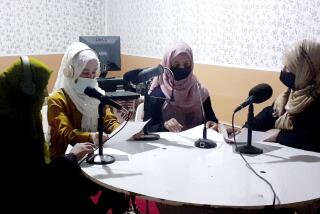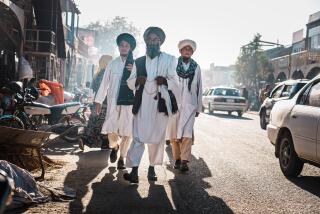The limits of propaganda
- Share via
THE CRUSHING VICTORY of Hamas in the Palestinian elections has starkly revealed the bankruptcy of the Bush administration’s strange strategy of trying to democratize Arabs while ignoring their feelings and opinions. Democracy is, obviously, representative. If the United States acts in ways that the great majority of Arabs see as hostile to their interests, Arab democracy will produce outcomes that are hostile to American interests.
One of the chief means by which democracy was supposed to be preached to Arabs is the U.S. Arabic-language television station Al Hurra (“the Free One”) and its sister station, Radio Sawa (“Together”). Instead, these government-funded stations represent everything that is wrong and misconceived about official U.S. ways of approaching the Arab world.
Widespread Muslim fury at the European media’s caricatures of the prophet Muhammad, and widespread Western incomprehension of that fury, illustrate the extent to which we are still talking past each other. Clearly there is an urgent need for media that will bridge this gap. But to be effective, they have to be credible with Muslims -- which Al Hurra is not.
Still, President Bush has requested a 13% spending increase for Al Hurra. Yet, according to a recent Zogby poll, only 1% of Arab viewers watch it as their first choice. Al Hurra claims 21.3 million viewers, but it will not publish the Nielsen survey that supposedly supports this figure. The station is rightly regarded by most Arabs as a mouthpiece for the Bush administration.
This is because Al Hurra’s basic conception is wrong. As its name suggests, it was modeled on U.S. stations like Radio Free Europe. These were founded during the Cold War to counter Soviet communist propaganda and to spread democratic ideas. They played a useful role in that struggle.
But in the Cold War, the U.S. was facing a hostile, totalitarian empire and a monolithic media rigidly controlled by the Soviet Communist Party. The situation in the Arab world is utterly different. Arabs may be oppressed by their own governments, but with the exception of the Palestinians and some Iraqis, they are not seeking liberation from alien domination. And their media are now genuinely diverse. There are more than 200 competing satellite television channels. The ones with serious news services do show deference to their government sponsors -- but then, these Arab governments themselves have very different cultures, attitudes and policies.
As a consequence, Arab viewers now have access to a variety of views on issues, including democracy, terrorism, religion, the role of women, economic reform and relations with Iran. The most well-known Arabic stations, Al Jazeera and Al Arabiya, have some genuine independence.
Because these stations opposed and strongly criticized the U.S. invasion of Iraq, and have given prominence to negative stories about U.S. policies, they and the Arab media in general have been treated as enemies by the Bush administration, the U.S. media and many U.S. politicians.
If, however, these stations’ attitudes toward our original enemies in the “war on terror” -- the perpetrators of 9/11 -- are examined, the situation looks very different. The executives and journalists of these stations know what the Taliban and Al Qaeda did in Afghanistan -- and what an Al Qaeda regime would do to them personally. Most want democratic progress for their countries.
These stations have broadcast Al Qaeda statements as news, but they also have broadcast ferocious criticism of Al Qaeda’s actions and ideology. And they have suffered for this. Following criticisms of Al Arabiya by Islamist insurgents, its Baghdad office was destroyed in a suicide bombing, killing five of its staff.
The propaganda techniques of the Cold War made sense once. But such state propaganda is not the real American way. Rather, our approach should be based on Oliver Wendell Holmes’ belief that “the best test of truth is the power of the thought to get itself accepted in the competition of the market.” The Arab media provide such a market. Let’s compete in it with the high-quality, independent media that the U.S. produces and Arabs respect. Al Hurra should be closed down at once.
More to Read
Sign up for Essential California
The most important California stories and recommendations in your inbox every morning.
You may occasionally receive promotional content from the Los Angeles Times.










